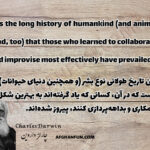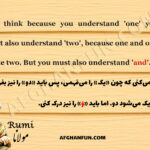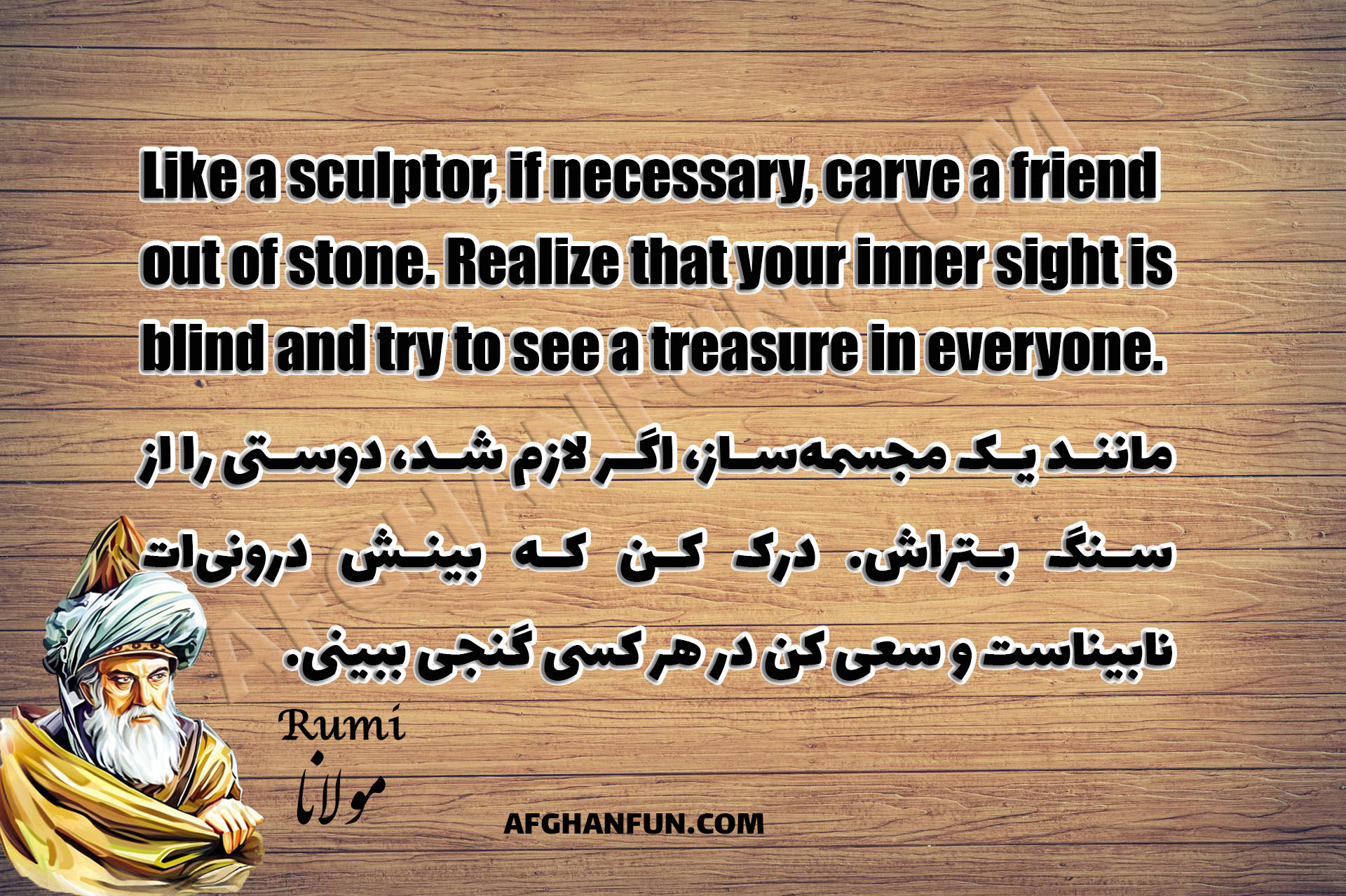A Stone, a Friend, a Treasure: Rumi’s Poetic Wisdom
Like a sculptor, if necessary,
Rumi
carve a friend out of stone.
Realize that your inner sight is blind
and try to see a treasure in everyone.
The Dance of Perception: Rumi’s Words on Seeing Others
مانند یک مجسمهساز، اگر لازم شد،
مولانا
دوستی را از سنگ بتراش.
درک کن که بینش درونیات نابیناست
و سعی کن در هر کسی گنجی ببینی.
این سخن مولانا به ما میآموزد که دوستی چیزی نیست که همیشه بهسادگی به دست آید، بلکه گاهی باید برای یافتن یا ساختن آن تلاش کرد، حتی اگر شرایط سخت و غیرممکن به نظر برسد. تشبیه «مجسمهساز» نشان میدهد که دوستی نیاز به صبر، هنر و دقت دارد؛ همانگونه که یک مجسمهساز از دل سنگ اثری زیبا خلق میکند، ما نیز میتوانیم از دل سختیها و تفاوتها، روابطی عمیق و ارزشمند بسازیم.
بخش دوم این نقلقول به مفهوم «بصیرت درونی» اشاره دارد. مولانا میگوید که گاه چشم درون ما نابیناست و قادر به دیدن زیباییهای پنهان در افراد نیست. به همین دلیل، باید تلاش کنیم تا در هر انسانی گنجی ببینیم، یعنی خوبیها و ارزشهای او را کشف کنیم. این نگاه، ما را از پیشداوری و سطحینگری رها کرده و به سمت مهربانی، درک و محبت سوق میدهد.
Are You a Sculptor of Friendships? Rumi’s Powerful Metaphor
Мисли ҳайкалтарош, агар лозим шавад,
МАВЛОНО ҶАЛОЛУДДИН МУҲАММАДИ БАЛХӢ
дӯстро аз санг битарош.
Фаҳм, ки басиратат кӯр аст,
ва кӯшиш кун, ки дар ҳар кас ганҷеро бубинӣ.
Ин суханони Мавлоно як паёми амиқро дар бораи дӯстӣ ва дарки ботинӣ мерасонанд. Ӯ инсонро ба ҳайкалтарош монанд мекунад, ки ин нишон медиҳад: барои пайдо ё эҷод кардани дӯстии ҳақиқӣ заҳмат ва сабр лозим аст. Ҳамин тавре ки ҳайкалтарош аз як пораи санг асари зебо месозад, мо низ метавонем бо меҳрубонӣ ва фаҳмиш аз сахтиҳо ва фарқиятҳо дӯстии самимӣ ба вуҷуд орем.
Қисми дуюми сухан ба басират ва дарки ботинӣ ишора мекунад. Мавлоно мегӯяд, ки чашми ботинии мо метавонад кӯр бошад, яъне мо наметавонем зебоии ҳақиқии одамонро бубинем. Аз ин рӯ, бояд кӯшиш кунем, ки дар ҳар кас ганҷеро бубинем — яъне некӣ ва арзишҳои онҳоро дарк кунем. Ин гуна назар моро аз пешдовариҳои ноодилона раҳо карда, ба сӯи муҳаббат, ҳамдардӣ ва самимият мебарад.
Can You See Beyond the Surface? Rumi’s Challenge to Our Perceptions
كالنحّات، إن لزم الأمر،
مولانا جلال الدین محمد الرومي
انحت صديقًا من الحجر.
أدرك أن بصيرتك الداخلية عمياء،
وحاول أن ترى كنزًا في كل شخص.
هذه الكلمات من مولانا تحمل رسالة عميقة عن الصداقة والرؤية الداخلية. فهو يشبه الإنسان بالنحّات، مما يدل على أن بناء الصداقة الحقيقية قد يتطلب جهدًا وصبرًا، تمامًا كما ينحت النحّات تمثالًا جميلًا من صخرة صلبة. ليس من الضروري أن نجد الأصدقاء بسهولة، بل علينا أن نصنعهم من خلال التفهم والمودة والاحترام.
أما الجزء الثاني، فيشير إلى أن البصيرة الداخلية للإنسان قد تكون عمياء، مما يعني أننا قد نحكم على الآخرين بسطحية أو نغفل عن قيمتهم الحقيقية. ولذلك، يجب أن نحاول رؤية الكنز المخفي في كل شخص، أي البحث عن الخير والجمال في الناس بدلاً من التركيز على العيوب. هذه الرؤية تساعدنا على بناء علاقات أكثر حبًا ورحمة، وتفتح لنا أبواب السعادة والانسجام.
Rumi‘s quote is a profound piece of wisdom that invites deep reflection on human relationships, self-awareness, and the way we perceive others. Let’s break it down and analyze its layers of meaning:
1. “Like a sculptor, if necessary, carve a friend out of stone.”
- Metaphor of the Sculptor: Rumi uses the imagery of a sculptor to illustrate the effort and intentionality required in building meaningful relationships. A sculptor works patiently, chiseling away at raw stone to reveal a beautiful form. Similarly, friendships and connections often require effort, patience, and persistence to uncover the beauty within others.
- “Carve a friend out of stone”: Stone is hard and unyielding, symbolizing the challenges we face in understanding or connecting with others. It suggests that even when someone seems difficult, distant, or unapproachable (like stone), we can still “carve” out a meaningful relationship by investing time, care, and understanding.
- Active Role in Relationships: Rumi emphasizes that we are not passive in our relationships. We must actively shape and nurture them, even when it feels challenging.
2. “Realize that your inner sight is blind.”
- Self-Awareness and Humility: This line is a call to recognize our own limitations in perceiving others. Our “inner sight” (our ability to truly see and understand others) is often clouded by biases, judgments, and preconceived notions. Rumi urges us to acknowledge this blindness and approach others with humility.
- The Illusion of Perception: We often think we see others clearly, but our perceptions are filtered through our own experiences, emotions, and ego. Rumi reminds us that our vision is imperfect and that we must strive to see beyond surface appearances.
3. “Try to see a treasure in everyone.”
- Inherent Worth in Every Person: Rumi encourages us to look for the inherent value and potential in every individual, regardless of how they may appear on the surface. Everyone has a “treasure” within them—unique qualities, wisdom, or beauty—that may not be immediately visible.
- Compassion and Empathy: This line calls for a shift in perspective, urging us to approach others with compassion and curiosity rather than judgment. By seeking the “treasure” in others, we cultivate deeper connections and a more loving, inclusive worldview.
- Transformative Power of Perception: When we choose to see the good in others, we not only enrich our relationships but also transform ourselves. This act of seeing beauty in others can soften our hearts and expand our capacity for love.
Themes and Lessons in the Quote:
- Effort in Relationships: Relationships require intentional effort and patience, much like the work of a sculptor.
- Self-Reflection: We must recognize our own limitations in understanding others and approach them with humility.
- Universal Value: Every person has inherent worth and potential, even if it is not immediately apparent.
- Compassionate Perception: By choosing to see the good in others, we foster deeper connections and a more loving worldview.
Practical Application:
- In daily life, this quote encourages us to:
- Be patient and persistent in building relationships, even when they feel challenging.
- Reflect on our own biases and judgments, striving to see others more clearly.
- Look for the unique strengths and beauty in everyone we encounter, fostering a mindset of appreciation and respect.
Rumi’s words remind us that the way we perceive and engage with others is a reflection of our own inner state. By cultivating a deeper, more compassionate vision, we not only enrich our relationships but also transform ourselves.











